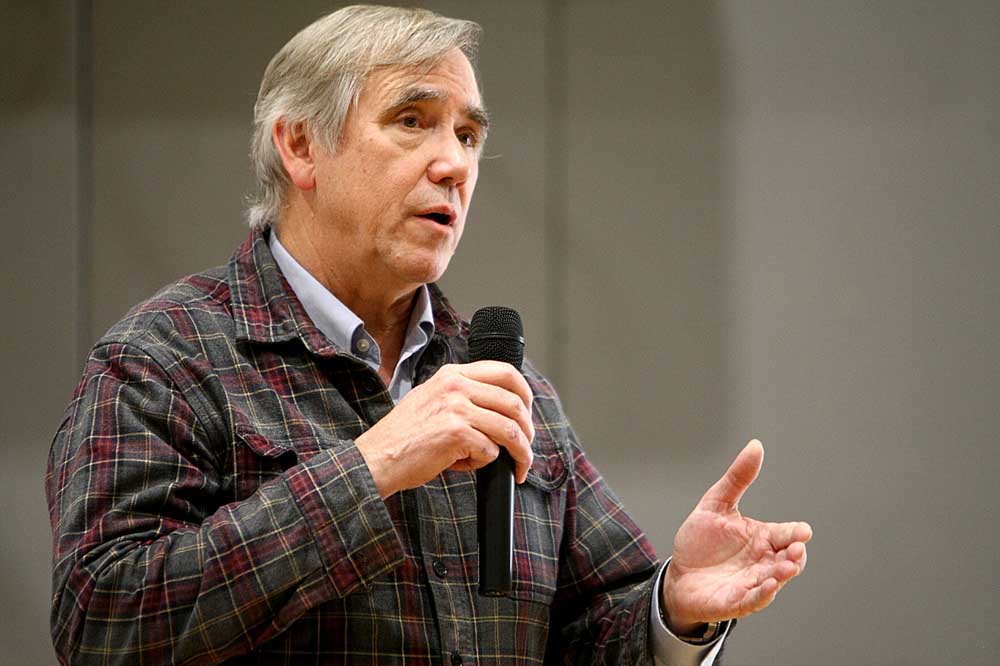Capital Chatter: Vet program cash causes conundrum
Published 8:00 am Thursday, December 13, 2018

- Capital Chatter: Dangerous times for the Oregon Legislature
Some Oregon counties had difficulty spending the money they received for veterans services after voters passed Measure 96 in 2016.
The measure, which was hugely popular with voters, allocates 1.5 percent of Oregon Lottery revenue for veterans programs. It nearly doubled the money that the Oregon Department of Veterans’ Affairs passes along to county veterans offices.
Trending
ODVA Director Kelly Fitzpatrick said the resulting conundrum was two-fold. Counties were not prepared for “this great influx” of money, and counties operate on an annual budget whereas the state runs on a two-year budget cycle.
State Rep. Paul Evans, D-Monmouth, was sympathetic. But he emphasized, sternly, that counties need to use the state money, spend it effectively and not treat it as an excuse to reduce their own funding for veterans programs.
Evans chairs the House Committee on Veterans and Emergency Preparedness, which has a tradition of being nonpartisan, in part because it has an equal number of Democratic and Republican members.
“No one knows and cares what your affiliation is. We’re here to do a job for veterans,” said Rep. Sal Esquivel, R-Medford, who is retiring at the end of this year.
Esquivel said that with his retirement and that of Rep. Gene Whisnant, R-Sunriver, the Legislature no longer will include any Vietnam veterans.
Oregon has about 303,000 veterans. They receive $2.8 billion in federal benefits each year. A continuing challenge in Oregon and other states is to reach all veterans, help them navigate the federal system and get them the benefits to which they are entitled.
Trending
State Rep. Julie Parrish, R-West Linn, said the Secretary of State’s Office used Facebook to track down inactive voters, informing them their voter registration was in danger of lapsing. Could the ODVA do something as basic as that?
Parrish lost her re-election bid this year, but she is not going away. She said she would keep fighting Gov. Kate Brown over reductions in the ODVA budget.
No unanimity: Rep. Bill Post, R-Keizer, broke the committee’s string of unanimous votes, refusing to support its draft bills for the 2019 Legislature.
Post did not disagree with the bills. He said legislative committees will change as new lawmakers take office in January and others leave, so it was inappropriate for current committee to introduce legislation.
We’re worse off than we realize: A House committee received horrifying reports this week about the state’s readiness to survive “The Big One.”
The Oregon Seismic Safety Policy Advisory Committee was established in 1991, and its latest reports show the state remains woefully unprepared. Oregon has a competitive market for earthquake insurance, but the committee said the state should focus more on retrofitting single-family homes to survive a quake. A Cascadia quake and tsunami will overwhelm all levels of government in Oregon, and there is a critical lack of planning and coordination among government agencies.
A Holocaust survivor killed: A car struck and killed Alter Wiener, 92, as he was in a crosswalk Tuesday evening in Hillsboro. Wiener was the only member of his family to survive the Holocaust, which he wrote about in “From a Name to a Number: A Holocaust Survivor’s Autobiography.”
In September, he testified before the Oregon Senate Education Committee in support of proposed legislation to require that schools teach about the Holocaust and genocide. The proposal, from state Sen. Rob Wagner, D-Lake Oswego, received a positive response.
Political ships passing in the daylight: Last week’s Oregon Leadership Summit was an odd event. I’m still not sure what to make of it.
It opened with Gov. Brown leading a panel of business leaders, chosen by her office. She lauded them and they returned the praise. Brown reprised her recent 2019-21 state budget message, as if the summit participants would be unaware of her financial proposal and political rationale.
It was if Brown, et. al., was going one way, the rest of the day’s speakers were going another, and the organizers were resigned to being at odds with the governor.
During the opening panel, there was little talk of PERS reform. That came later. Tim Nesbitt, a former union leader and top gubernatorial aide, described the PERS crisis so graphically that even experienced legislators said they learned from it.
The star of the day was Kali Thorne Ladd, the co-founder and executive director of KairosPDX, which describes itself as “an education nonprofit focused on delivering equitable education to underserved children, their families and their communities.”
Ladd also chairs the Portland Community College board. I first met her a year ago, when I gave a keynote speech for the Chalkboard Project and moderated a panel that included her.
As she spoke at the Leadership Summit, people put down their smartphones and paid attention to her “Letter to Oregon.” She spoke with energy, passion and the statistics to back up her convictions that Oregon invests inadequately and inequitably in public education.
Watching people’s body language, I would guess she changed some minds.
No sign of Richardson: Secretary of State Richardson issued a statement this week saying he would be releasing an audit on Oregon’s response to the opioids epidemic. He encouraged people to watch the press conference online.
Richardson, who is dealing with brain cancer, did not attend. He lives in Southern Oregon and I was told he was at his state office there.
He also did not participate in the October meeting of the State Land Board, which is made up of the governor, State Treasurer Tobias Read and Richardson. The board meets again Tuesday in Salem for a potentially heated meeting about the Elliott State Forest.
On Thursday, Richardson released video updating his condition, saying the tumor had not grown, some days are better than others and speaking is more difficult sometimes.
Oregon leadership in Congress: As expected, Sen. Ron Wyden will remain the top Democrat on the Senate Finance Committee and Rep. Peter DeFazio will chair the House Transportation and Infrastructure Committee when the new Congress convenes in January.
Wyden, who also is a senior member of the Senate Intelligence Committee, delivered the Weekly Democratic Address last weekend. He praised the late President George H.W. Bush and called for Republican support of legislation to prevent President Donald Trump from undermining the ongoing investigation by Special Counsel Robert Mueller.
“The Mueller investigation is rooting out crime and corruption that Trump and his associates are desperate to cover up. That’s why the president is lashing out,” Wyden said his four-minute video.
“There is bipartisan legislation at the ready that would defend Bob Mueller against Trump’s attacks on his work, but (Senate Majority Leader Mitch McConnell) has blocked it at every turn. That cannot go on any longer.”
Dick Hughes, who writes the weekly Capital Chatter column, has been covering the Oregon political scene since 1976. Contact him at TheHughesisms@Gmail.com , Facebook.com/Hughesisms, YouTube.com/DickHughes or Twitter.com/DickHughes.





